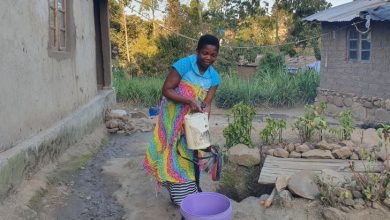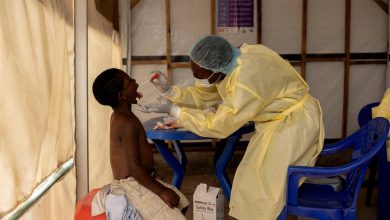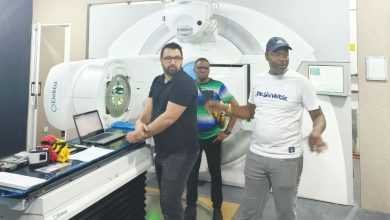‘Every birth-related death tells a story’
Flossie Maloya could not wait to have her first baby at Chikwawa District Hospital in May, but she needed a blood transfusion following severe bleeding.
For three days, health workers monitored her condition until she was ready to surgically deliver the baby.

“The health workers were prompt, polite and always alert. They have saved my life,” she said in a delivery room where 15 to 20 babies are born daily.
Equally excited with the quality service provision was nursing officer Nyson Sekani. He arrived at the hospital five years ago when a similar case at Ngabu Rural Hospital culminated in a tragedy.
He recalls: “The bleeding patient died because the rural hospital couldn’t provide blood transfusion due to lack of skills and tools.
“We identified skills gaps during follow-ups, including a collective audit of the maternal death. We ensured that relevant staff were adequately mentored and equipped for women at risk of dying from severe bleeding to receive blood near their home. The transfusion services at Ngabu Rural Hospital resumed this year.”
The Ministry of Health requires its staff to investigate the cause of every maternal death as a learning point and a matter of accountability.
Such audits are part of Umoyo Wathu, the six-year United Nations Joint Programme for Health Systems Strengthening. Now in its fourth year, the initiative is jointly implemented by Unicef, UNFPA and the World Health Organization with funding from the UK’s Foreign Commonwealth and Development Office. It seeks to halve maternal and newborn deaths and stillbirths in health facilities.
Sekani, safe motherhood coordinator at the Chikwawa District Health Office (DHO), says the mandatory maternal death audits provide a bittersweet learning moments in his 28-year nursing career.
“I’m happy when my clients get good outcomes, especially where no life is lost while giving birth. The smiles of women returning home with healthy babies fill me with immense joy,” he explains.
Sekani receives reports from all 30 health facilities in the districts, including pregnancy-related deaths happening outside the clinical settings.
“Every maternal death tells a story. When it occurs, I feel discouraged. I feel like we have failed to do what we are supposed to do as a team. It feels like we laboured in vain,” he says.
Every death of a pregnant woman or newborn kick-starts an inquiry.
“Immediately, we report the death to the central office at the Ministry of Health and update an online form within 24 hours. Within seven days, the MPDSR committee comprising 20 section heads and community representatives meets to analyse why that death occurred and what we could have done better,” he explains.
Investigating every death and near-miss helps role players close the gaps to avert preventable deaths, complications and delays.
The inquiries have revealed massive delays in seeking assistance from skilled caregivers, increasing the risk of pregnant women and newborn babies dying outside the nearest health facility.
Besides, the district’s overwhelmed healthcare workers mainly lacked life-saving skills and equipment, including gloves, stationery, and suction machines to remove retained products of conception.
With seven of Chikwawa DHO’s 14 ambulances grounded, it was difficult to rapidly evacuate emergency cases from hard-to-reach health centres reduced to islands by tricky rivers to better-equipped hospitals.
“Through the audits, we identify gaps and skills that could have saved lives. Even without maternal deaths, we still meet monthly to audit if we are implementing what we agreed or learned from the previous cases,” Sekani explains.
The stock-take convenes 20 representatives of relevant departments—from transport to laboratory, safe motherhood, radiology, maternity, and pharmacy—with external supervisors from the district health management team.
“The main lesson is that we can improve the quality of maternal services for the benefit of our clients if we learn from our mistakes and intensify mentorship to close the knowledge and skills gap identified,” he says.
Sekani’s team has mentored over 50 peers from Chikwawa District Hospital and Makhuwira, St Montfort Mission, Mkumaniza, Ngabu, and Chapananga health centres.
“The peer-to-peer training has helped reduce maternal death rates from 112 in every 100 000 live births to 98 since 2020. Overall, the district ranked seventh out of all the 28 districts in the country, an improvement from number 17 in the previous year. We expect further improvements as our staff acquire vital skills to make better, timely decisions to save lives.”
Hellen Mwafulirwa, a nurse who heads Chikwawa District Hospital’s neonatal unit, rarely reports preventable deaths of newborn babies.
She explains: “Our staff had skills gaps, including how to resuscitate a mother who is bleeding severely, and babies choked during delivery.”
“However, the training has boosted our expertise and morale. With improved quality of service delivery, women now trust us as health workers and a health facility. More and more women now come to safely give birth in health facilities, not risking their lives at the hands of banned traditional birth attendants.”



